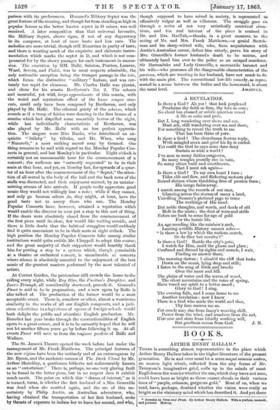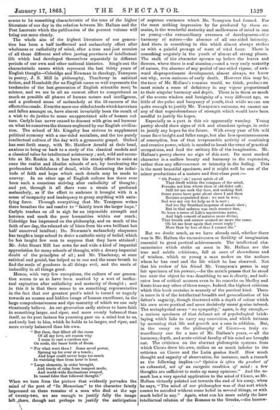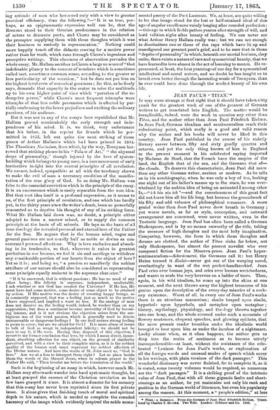BOOKS.
ARTHUR HENRY HALLAM.* THERE is something almost representative in the place which Arthur Henry Hallam takes in the higher literature of the present generation. He is and ever must be a mere magninominis umbra, an unseen light which, reflected from the airy forms of Mr. Tennyson's imaginative grief, calls up in the minds of most Englishmen the wonder whether the sun, which they have not seen, could have been as bright as those sunset clouds in their various hues of" purple, crimson, gorgeous gold." Most of us, when we read, have, perhaps, doubted whether the vision were really so bright as the visionary mind which has described it. And yet there
* Bowfin, in Verse and Prose. By Arthur Henry Hallam. With a preface, memoir, and portrait. Murray.
seems to be something characteristic of the tone of the higher literature of our day in the relation between Mr. Hallam and the Poet Laureate which the publication of the present volume will bring out more clearly.
The whole aim of the highest literature of our genera- tion has been a half ineffectual and melancholy .effort after wholeness or catholicity of mind, after a true and just reunion of all those different and often jarring provinces of intellectual life which had developed themselves separately in different periods of our own and other national histories. Single out the characteristic names which represent the last thirty years of English thought—Coleridge and Newman in theology, Tennyson in poetry, J. S. Mill in philosophy, Thackeray in satirical fiction, and Humboldt (for no English name so well represents the tendencies of the last generation of English scientific men) in science, and we see in all an earnest effort to comprehend as much as possible all phases of human nature and intelligence, and a profound sense of melancholy at the ill-success of the efforts thus made. E yen the more one-sided schools which haverisen and fallen amongst us, have almost invariably been the result of a wish to do justice to some unappreciated side of human cul- ture. Carlyle has never ceased to descant with grim sad humour on what he conceives the themes neglected by our English civiliza- tion. The school of Mr. Kingsley has striven to supplement political economy with a one-sided socialism, and the too purely intellectual culture of the day with a gymnastic gospel. Oxford has sent forth many, with Mr. Matthew Arnold at their head, anxious to bring us back to a study of the classical models and a classical value for intellectual aristocracy ; and, wild and eccen- tric as Mr. Ruskin is, it has been his steady effort to unite at once the realist and idealist schools of art, by inculcating the profoundest faithfulness of detail, while illustrating the infini- tude of faith and hope which such details may be made to convey. In no other age of English culture has there ever been such a conscious striving after catholicity of thought; and yet, through it all there runs a strain of profound melancholy, as if the effort to embrace it brought with it a sense of incapacity and inadequacy to grasp anything with satis- fying force. Through everything that Mr. Tennyson writes there breathes the sad resolve to "faintly trust the larger hope." Carlyle teaches us all to sigh for an impossible strength and heroism and mock the poor humanities within our reach; Coleridge has impressed on the philosophy, and on much of the faith of our day, the relaxed air of hints from his own brilliant but half unnerved. intellect; Dr. Newman's melancholy eloquence has taught a large school to desire a catholic unity of belief, which he ha's taught few men to suppose that they have attained ; Mr. John Stuart Mill has sown far and wide a kind of impartial appreciation for many schools of thought, with a dreary impartial doubt of the principles of all ; and Mr. Thackeray, at once satirical and genial, has helped us in one and the same breath to find the seeds of goodness in all things evil, and the seeds of imbecility in all things good.
Hence, with very few exceptions, the culture of our genera- tion seems to us to have been marked by a sort of ineffec- tual aspiration after catholicity and matutity of thought ; and in this it is that there seems to us something representative in the fact that our greatest poet's mind is turnei so eagerly towards an unseen and bidden image of human excellence, in the large comprehensiveness and ripe maturity of which we can only vicariously believe. As our generation sadly strives to have faith in something larger, and riper, and more evenly balanced than itself, so its poet fastens his yearning gaze on a mind lost to us, and early lost to him, which he holds to be larger, and riper, and more evenly balanced than his own.
"But thou, that Sliest all the room Of all my love, art reason why I seem to cast a careless eye On souls, the baser lords of doom.
"For what wert thou ? Some novel power, Sprang up for ever at a touch ; And hope could never hope too much In watching thee from hour to hour.
"Large elements, in order brought, And tracts of calm from tempest made, And world-wide fluctuations swayed, In vassal tides that followed thought."
'When we turn from the picture that evidently pervades the mind of the poet of "In Memoriam" to the character faintly impressed on these remains of a man who died at the age of twenty-two, we see enough to justify fully the image left „there, though not perhaps to justify the anticipation of supreme eminence which Mr. Tennyson had formed. For the most striking impression by far produced by these re- mains, is the wonderful maturity and mellowness of mind in one so young—the extraordinary evenness of development—the harmony of nature—the absence of all one-sided intensity. And there is something in this which almost always strikes us with a painful presage of want of vital force. There is something ungainly in the youth of almost all strong plants. The stalk of the character sprouts up before the leaves and flowers, where there is real stamina ;—and a very early maturity of nature, the absence of any period of one-sided vigour, of awk- ward disproportionate development, almost always, we know not why, seem ominous of early death. However this may be, the tone of Mr. Hallam's remains would, we think, produce on most minds a sense of deficiency in any vigour proportioned to their singular harmony and depth. There is in them so much of the serene wisdom and benignity of a very different age, so little of the pulse and buoyancy of youth, that while we can see quite enough to justify Mr. Tennyson's estimate, we cannot see any of that superabundance of strength which would have been needful to justify his hopes.
Especially as a poet is this via apparently wanting. Young poetry should show signs of rich and abundant springs, in order to justify any hopes for the future. With every year of life will come finer insight and fuller range, but also less spontaneousness of conception, less of that irrepressible activity of combining and creative power, which is needed to break the crust of practical occupations, and feed the solitary life of the imagination. Mr. Hallam's poetry shows no sign of this sort. Its most marked character is a mellow beauty and harmony in the expression, rather than any effervescence or intensity in the feeling. This is the most beautiful specimen, and it might well be one of the minor productions of a mature and first-class poet :—
" Oh Poetry ! oh ! rarest spirit of all
That dwell within the compass of the mind, Forsake not him whom thou of old didst call: Still let me seek thy face, and seeking find.
Some years have gone about since I and thou Became acquainted first : we mot in woe ; Sad was my cry for help as it is now ; Sad too thy breathed response of music slow ; But in that sadness was such essence fine, So keen a sense of Life's mysterious name, And high conceit of natures more divine, That breath and sorrow seemed no more the same. Oh let me hear again that sweet reply ! More than by loss of thee I cannot die."
But we doubt much, as we have already said, whether there was in Mr. Hallam the excursiveness or fertility of imagination essential to great poetical achievements. The intellectual cha- racteristics which strike us most in Mr. Hallam are the true and subtle criticisms, full at once of shrewdness and of wisdom, which so young a man makes on the authors whom he has read and the life which he has observed. Not that his review of his friend Mr. Tennyson's poems is any fair specimen of his powers,—for the article prestes that he stood too near the object he was describing to see it clearly, and indi- cates less of critical acumen even in its remarks on Shelley and Keats than any other of these essays. Indeed, the highest criticism which this book contains is scarcely of the poetical kind. There is more in it of the intellectual breadth and generalization of his father's sagacity, though tinctured with a depth of colour which his own more poetical and more decisively moral genius infused. The metaphysical essay "on sympathy," again, is dry enough,— a curious specimen of that defunct art of psychological brick- laying which fails to carry any conviction, and which irritates by assuming that life and growth are a sum in addition. But, in the essay on the philosophy of Cicero—a truly ex- traordinary one for a man of Mr. Hallatn's years, — all the harmony, depth, and acute critical faculty orhis mind are brought out. The criticism on the abstract philosophic systems from which Cicero drew his own, strikes us as much inferior to the criticism on Cicero and the Latin genius itself. How much thought and sagacity of observation, for instance, such a remark as the following implies :—" Opinion is often the product of an exhausted, not of an energetic condition of mind : a few thoughts are sufficient to make up many opinions." And the re- mark has a very special application to the mind of Cicero, as Mr. Hallam virtually pointed out towards the end of his essay, when he says, "The mind of our philosopher was of that sort which cannot be satisfied without some belief in several things, or with much belief in any." Again, what can hit more subtly the later intellectual relation of the Romans to the Greeks,—the borrow- lug attitude of men who borrowed only with a view to greater practical efficiency, than the following ?—" It is as true, per- haps, as an epigrammatic expression well can be, that the Romans stood to their Grecian predecessors in the relation of actors to dramatic poets, and Cicero may be considered as the prompter supplying them with those thoughts which it was their business to embody in representation." Nothing could more happily touch off the didactic craving for a motive power rather than for truth, which runs through Cicero's ingenious and preceptive writings. This closeness of observation pervades the whole essay. Mr. Hallam ascribes to Cicero a large measure of" that indefinable pliancy to the consent of numbers which is sometimes called tact, sometimes common sense, according to the greater or less particularity of the occasion ; " but he does not put him on the highest level even of oratorical greatness ; for this, as he finely says, demands that capacity in the orator to raise the multitude up to his own higher point of view which "partakes of the re- demp:ive power," while Cicero's most frequent triumphs were triumphs of that less noble persuasion which is effected by par- tially conforming to the lower prejudices and exciting the ordinary passions, of his audience.
But it was not in any of the essays here republished that Mr.
Hallam proved unmistakably the early strength and inde- pendence of his mind. It is, we think, very unfortunate that his father, in the reprint for friends which he per- mitted in 1853, left out quite the most striking of those pieces of Arthur Hallam's which hal been printed in 1834.
The Theodicxa Nocissima, from which, by the way, Tennyson bor- rowed that striking phrase in his "Palace of Art," " the abysmal deeps of personality," though injured by the love of system-
building which belongs to young men, is a rare monument of early instinctive int-ight into the central principles of all revelation.
We cannot, indeed, sympathize at all with the tendency shown to make the evil of man a necessary condition of the manifes- tation of the true glory of God. In so doing Mr. Hallam was false to the essential conviction which is the principle of the essay. It is an excrescence which is easily separable from the root idea. But that root idea itself is a profound expression, as it seems to us, of the first principle of revelation, and one which has hardly yet, in the thirty years since the writer's death, been so powerfully reasserted as to deprive his thought of any of its striking force.
What Mr. Hallam laid down was, no doubt, a principle either adapted to form a narrow school, or to supply the common principle at the basis of all schools. He lays as the basis of all true theology the revealed personal and eternal love of the Father
for the Son. He argues that in the human mind, vague and general passions are not usually half as noble or divine as con-
centrated personal affections. Why is love exclusive and absorb- ing in its tendencies, so that, wherever it exists in greatest perfection in our bosoms, we feel it sin and sacrilege to withdraw any considerable portion of our hearts from the object of love ?
Yet so it is ; and being so, "a passion so manifestly the noblest attribute of our nature should also be considered as representing some principle equally eminent in the supreme charecter."
"If it be answered, God is without passions ; He has no need of any other being ; His felicity is supreme, independent, unalterable, I ask whether or not God has created the Universe ? If He has, He must have had some motive, some desire of some object to be attained by action. If His motive was the desire of creating happy beings, as is commonly supposed, that was a feeling just as much as the motive I have supposed, and implied a want no less. If the analogy of man does not deceive us, the feeling would, indeed, be weaker than on my supposition ; but does a sentiment become unworthy of God by becom- ing intense, and is it not obvious the objection arises from the am- biguous use of the word passion, which is generally used to denote unreasonable or dangerous feelings ? In our frail nature strong feeling is prone to error; but are we afraid for God? It is mere abuse of terms to talk of God as wrapt in independent felicity : we should not be here to say it, if He were. Having thus disposed of this objection, I revert to my former conclusion that love, by which I mean direct, imme- diate, absorbing affection for one object, on the ground of similarity perceived, and with a view to their complete union, as it is the noblest quality of the human soul, must represent the noblest affection of the Divine nature. And here the words of St. John meet us, "God is love." Are we at a loss to interpret them right ? Let us place beside them the word.s of the blessed Jesus, when in solemn prayer to the Father He said, "Thou lovedst me before the foundation of the world."
Such is the beginning of an essay in which, however much Mr. Hallam may afterwards wander into hard systematic thought, he at least grasped the essence of the Christian revelation as but few have grasped it since. It is almost a disaster for his memory that this essay has never been reprinted since its first private issue. It alone gives that finishing touch of moral and spiritual depth to his nature, which is needed to complete the rounded harmony of the image which evidently inspired the noble monu-
mental poetry of the Poet Laureate.. We, at least, are quite willing to let that image stand for the lost or half-attained ideal of this age of angular excellences vainly longing after rounded perfection; —this-age in which feeble pathos yearns after strength of will, and hard volition sighs after beauty of feeling. We can never see what Arthur Henry Hallam really was ; but we can see enough to discrimitiate two or three of the rays which have lit up and transfigured our greatest poet's grief, and to be sure that in those "depths of personality" in which, beneath our mortal horizon, they unite, there exists a natureof rare and symmetrical beauty, that we have learned to love almost in the act of learning to mourn. He re- presented, at least, the best yearnings of our day for a symmetrical intellectual and moral nature, and no doubt he has taught us to love it even better through the lamenting music of Tennyson, than he ever could have done through the modest beauty of his own life.
































 Previous page
Previous page